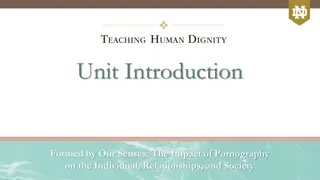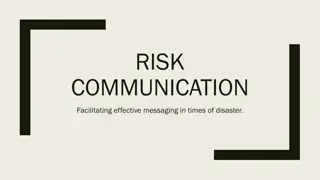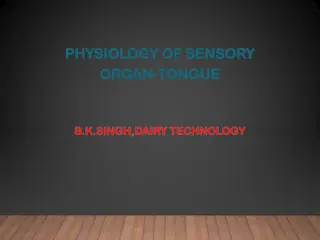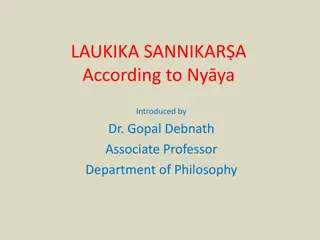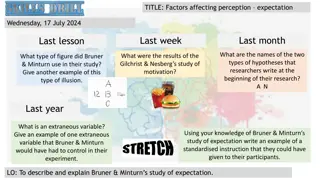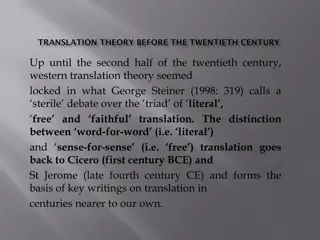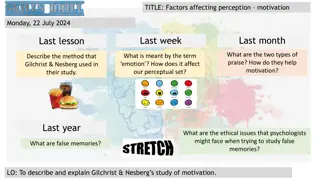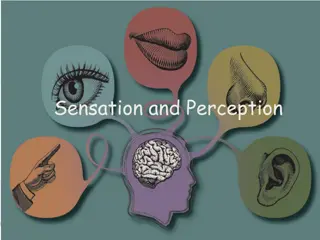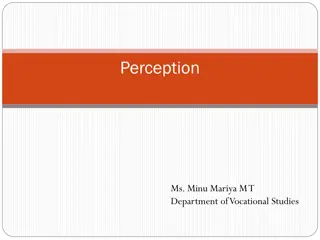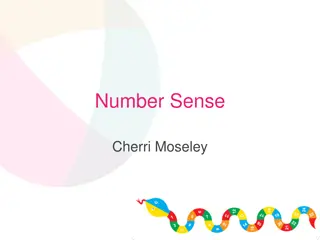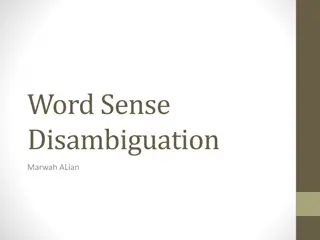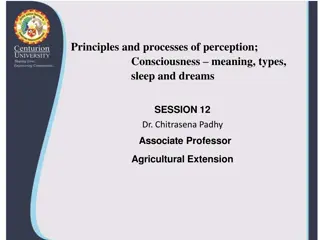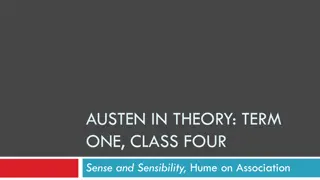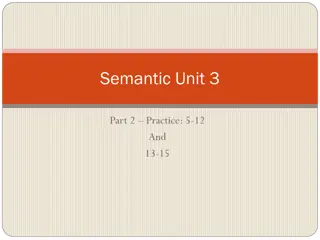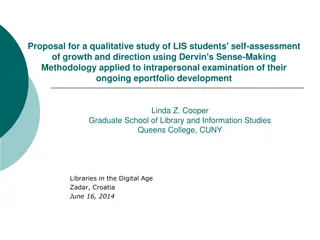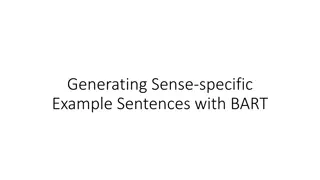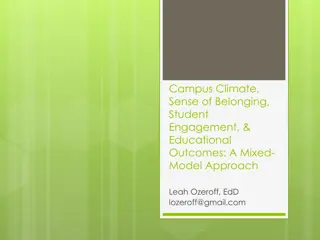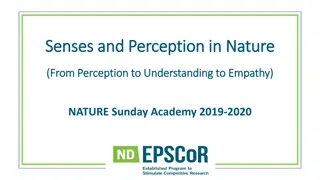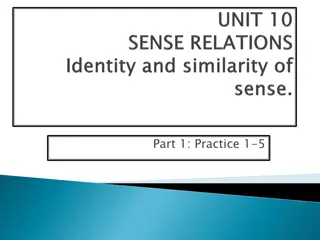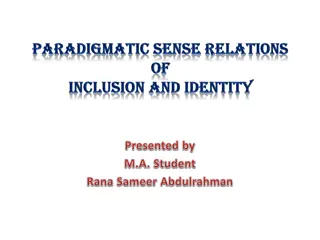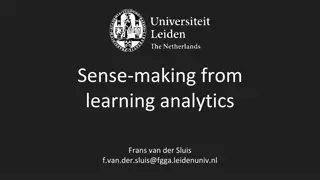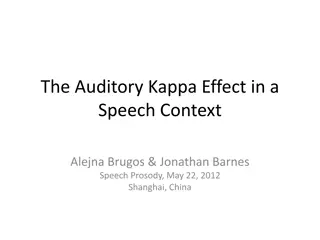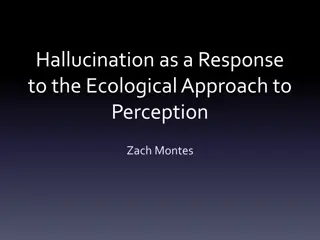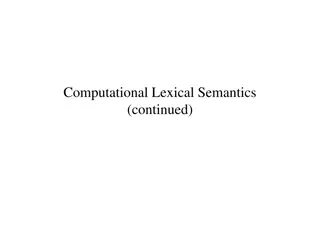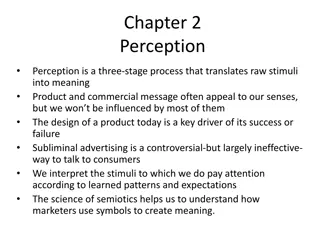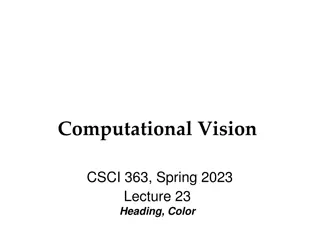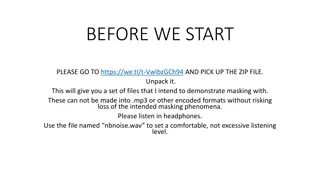Understanding the Impact of Pornography: Lessons in Human Dignity
Delve into the profound impact of pornography on individuals, relationships, and society through a series of lessons focusing on human senses, sense perception, and Catholic anthropology. Explore popular cultural understandings of love, the role of the senses in perception, and the detrimental effec
6 views • 7 slides
Jane Austen Sense and Sensibility
Sense and Sensibility by Jane Austen explores the societal norms and limitations imposed on women in 19th century England through the contrasting characters of Elinor and Marianne Dashwood. The novel satirizes the excessive sensibility and lack of practical sense in women of that era, shedding light
1 views • 11 slides
Unlock the power of real-time oil condition analysis with SENSE
\n\nUnlock the power of real-time oil condition analysis with SENSE-2! Easily install this monitoring kit on any equipment and start enjoying the benefits: \u2714\ufe0f Reduced oil use \u2714\ufe0f Lower maintenance costs \u2714\ufe0f Early fault detection. Say goodbye to guesswork and hello to effi
0 views • 2 slides
Effective Risk Communication Strategies in Times of Disaster
Risk communication plays a crucial role in conveying possible risky situations like natural disasters. Challenges include providing accurate information concisely, addressing cultural and language barriers, and avoiding causing alarm. Barriers to communication involve differences in perception, lack
3 views • 11 slides
Exploring Beauty and Perception Through Helen of Troy
Delve into the ephemeral nature of beauty as depicted through Helen of Troy in various literary works and artworks. Analyze the portrayal of Helen as a symbol of transient beauty and its impact on society's perception of women.
2 views • 10 slides
Decoding Symbolic Thinking: Exploring the Power of Symbols in Learning and Perception
Delve into the world of symbolic thinking through the eyes of renowned artist René Magritte and explore how symbols shape our perception and understanding of the world. From dissecting Magritte's iconic painting to unraveling the intricacies of language as a symbolic system, journey through the int
2 views • 15 slides
Understanding Cultural Values and Perception in Intercultural Communication
Factors such as family, history, religion, and cultural identity significantly influence individuals' decision-making processes and behaviors. Cultural values play a crucial role in shaping perceptions and attitudes towards various issues and events, which can differ across cultures. Recognizing and
2 views • 31 slides
Understanding the Physiology of the Sensory Organ - Tongue by B.K. Singh
Taste perception on the tongue is a vital sensory function involving sweet, sour, salty, and bitter sensations. The tongue, with its muscular movements and taste buds, plays a crucial role in mastication, swallowing, and food enjoyment. Different types of papillae on the tongue are responsible for t
4 views • 33 slides
Understanding Perception in Nyaya Philosophy: An Introduction to Laukika Sannikara
Nyaya philosophy defines perception as knowledge arising from the contact between a sense organ and its object, known as Sannikara. This contact can be direct or indirect, leading to various kinds of Sannikaras such as Sayoga, Sayokta-samavya, Samaveta-samavya, Samavya, and Viśeṣa-viśeṣabhāva
2 views • 10 slides
Factors Affecting Perception Expectation
This content covers various aspects related to perception and expectation, including the types of hypotheses in research, results of different studies on motivation and perception, examples of extraneous variables, standardized instructions in experiments, and evaluation of research methods. The stu
1 views • 9 slides
Evolution of Translation Theory: From Literal to Sense-for-Sense
Western translation theory up to the 20th century revolved around the debate of literal, free, and faithful translation. This discussion traces back to Cicero and St. Jerome and has influenced translation practices for centuries. While some advocated for word-for-word translations, others, like St.
1 views • 13 slides
Factors Affecting Perception and Motivation Study
Factors such as hunger can influence perception and motivation, as shown in the study by Gilchrist & Nesberg. Their research involved university students who went without food for 20 hours and were tested on how hunger affected their perception of brightness in images. The results indicated that mot
1 views • 11 slides
Sociology and Common Sense: Exploring the Boundaries
Sociology and common sense intersect in intriguing ways, with common sense offering raw material for sociological theories yet lacking the validity and reliability that sociology strives for. While common sense is rooted in tradition and often status quoist, sociology challenges the taken-for-grante
2 views • 11 slides
Understanding Sensation and Perception in Psychology
Sensation and perception play crucial roles in how we experience the world around us. Sensation involves the detection of stimuli through sensory organs, while perception involves the interpretation of these stimuli in the brain. The process includes transduction, where physical energy is converted
1 views • 19 slides
Understanding Perception in Organizational Behavior
Perception, as the process of interpreting sensory information, plays a crucial role in individual behavior within organizations. This article delves into the basics of perception, highlighting its impact on how individuals view reality, receive information, and make interpretations. It also explore
1 views • 14 slides
Understanding Sensation and Perception in Psychology
Explore the fascinating world of sensation and perception in psychology, where we delve into how our senses interact with stimuli to create our conscious experiences. Sensation involves the activation of our sense organs by external stimuli, while perception refers to the interpretation of those sti
3 views • 19 slides
Understanding Sensation and Perception in Psychology
Sensation and perception play crucial roles in how we interpret the world around us. Sensation is the process by which stimuli trigger our sensory receptors, while perception involves organizing and interpreting sensory information. This chapter delves into thresholds, sensory differences, Weber's L
0 views • 52 slides
Understanding Number Sense in Children: Development and Teaching Methods
Explore the concept of number sense, its development in children, effective teaching methods, and the impact of research findings on classroom practice. Learn about numerical fluency, components of number sense, and the role of place value, quantity, relationships, and symbols. Discover how to enhan
0 views • 28 slides
Understanding Word Sense Disambiguation: Challenges and Approaches
Word Sense Disambiguation (WSD) is a complex task in artificial intelligence that aims to determine the correct sense of a word in context. It involves classifying a word into predefined classes based on its meaning in a specific context. WSD requires not only linguistic knowledge but also knowledge
2 views • 12 slides
Principles and Processes of Perception: Understanding Consciousness and Patterns
Perception involves the complex processes of sensation, interpretation, and past experiences shaping our understanding of the world. Gestalt theories highlight pattern perception, while perceptual hypotheses influence our perception accuracy. The perception process entails selecting, organizing, and
0 views • 12 slides
Exploring Sense and Sensibility: Hume's Theory of Association
Delve into the connection between Sense and Sensibility in Austen's works and Hume's theory of association. Hume's emphasis on immediate experience aligns with Austen's plots, showcasing a coherence in their perspectives. The principle of connection between thoughts and ideas is highlighted, emphasi
1 views • 17 slides
Understanding Semantic Sense in Language Expressions
Explore the concept of semantic sense in language expressions, including the relationship between sense and reference, multiple senses of words, and examples of phrases with different meanings. Discover how sense plays a crucial role in understanding language and communication.
1 views • 15 slides
Self-Assessment of LIS Students' Eportfolio Development Using Sense-Making Methodology
Explore how LIS students assess their personal growth and direction through Dervin's Sense-Making Methodology applied to intrapersonal examination of their eportfolio development. The study aims to enhance students' sense of purpose, inform curriculum improvements, and promote reflective learning th
0 views • 24 slides
Generating Sense-specific Example Sentences with BART Approach
This work focuses on generating sense-specific example sentences using BART (Bidirectional and AutoRegressive Transformers) by conditioning on the target word and its contextual representation from another sentence with the desired sense. The approach involves two components: a contextual word encod
0 views • 19 slides
Promoting Civic Sense: Building a Better Community Together
Civic sense involves responsible behavior towards one's community and surroundings, enhancing the quality of life, building a sense of community, reducing pollution and littering, creating safer communities, ensuring enhanced safety, and improving infrastructure. It fosters unity, cleanliness, safet
1 views • 10 slides
Exploring Campus Climate, Sense of Belonging, and Student Engagement at a Women's College
This presentation delves into the experiences of students at a small, liberal arts women's college regarding campus climate, sense of belonging, and student engagement. Research questions focus on student perceptions, engagement levels, and their impact on educational outcomes. The study investigate
2 views • 23 slides
Factors Affecting Undergraduate Students' Sense of Belonging in STEM Disciplines
Student attrition in STEM fields remains a critical issue, with women and underrepresented minority students facing higher dropout rates. Sense of belonging is identified as a key factor influencing retention, particularly for female and URM students. This study explores various aspects, including r
0 views • 22 slides
Insights into Jane Austen's Sense and Sensibility
Jane Austen, an English novelist, delves into the themes of marriage, social standing, and economic security in her works, notably in "Sense and Sensibility". The novel follows the lives of the Dashwood sisters, Elinor and Marianne, exploring the contrast between sense and sensibility. With her biti
2 views • 12 slides
Understanding Sensory Perception in Nature
Sensory perception in nature explores the diverse ways organisms detect stimuli, encompassing traditional senses like sight and touch, as well as lesser-known senses such as thermoception and proprioception. Other organisms, including animals and plants, exhibit unique sensory abilities that aid in
0 views • 14 slides
Analyzing Mood and Perception in Literary Works
Analyzing the establishment of mood and changes in perception in different literary works. The author uses details from the passages to explain the mood set through descriptions, perception changes, and the use of sound. Explore how characters' feelings evolve over time.
0 views • 9 slides
Exploring the Sense of Touch: A Journey Through Our Senses
Our sense of touch plays a crucial role in how we perceive the world around us. Through our skin, we feel sensations like pressure, texture, and temperature, allowing us to interact with our environment. This interactive journey delves into the concept of touch as one of our five senses, exploring i
0 views • 7 slides
Understanding Sense and Reference in Everyday Language
Explore the use of words like "mean," "meaning," and "meant" in everyday language, delving into whether they indicate sense or reference in different contexts. Dive into examples and concepts like synonymy, sense, and interdependence, enhancing your understanding of language nuances.
0 views • 10 slides
Understanding Sense Relations in Linguistics
Sense relations play a crucial role in linguistics, influencing the significance and connection between words. Various aspects such as recurrence, discrimination, lexicalizability, abstract vs. concrete relations, multiple simultaneous relations, and the entities involved characterize sense relation
0 views • 17 slides
Sense-making from Learning Analytics: Exploring Challenges and Opportunities
This collection of images delves into the realm of learning analytics, emphasizing the complexities of sense-making and the challenges faced. It discusses the interpretation of granular behavioral measures, the role of proxies in understanding behavior, and the importance of selecting well-supported
0 views • 10 slides
Exploring the Auditory Kappa Effect in Speech Perception
The auditory kappa effect, originally observed in non-speech contexts, is investigated in speech perception. This study explores how pitch and timing interactions influence the perception of vowel duration and silent intervals in spoken words. Using the kappa cell paradigm, experiments examine the r
0 views • 42 slides
Understanding Hallucinations through Ecological Perception and Neurological Evidence
Exploring the phenomenon of hallucinations in relation to the ecological approach to perception, direct vs. indirect realism, and the concept of affordances in visual perception. Delving into the types of hallucinations, such as visual and complex hallucinations, and conditions like Charles Bonnet S
1 views • 16 slides
Understanding Word Sense Disambiguation in Computational Lexical Semantics
Word Sense Disambiguation (WSD) is a crucial task in Computational Lexical Semantics, aiming to determine the correct sense of a word in context from a fixed inventory of potential word senses. This process involves various techniques such as supervised machine learning, unsupervised methods, thesau
0 views • 67 slides
Understanding the Three-Stage Process of Perception
Perception is a complex three-stage process that involves translating raw stimuli into meaning. This process includes sensation, where sensory receptors respond to stimuli, and perception, where sensations are organized and interpreted. Marketers leverage sensory cues such as colors, sounds, and odo
0 views • 8 slides
Understanding Computational Vision and Color Perception
Explore the role of MST in heading computation, the influence of eye movements on MSTd cells, and how light wavelengths and color perception are intertwined. Discover the complexities of neural processing in color perception and how it shapes our visual experiences.
0 views • 28 slides
Understanding Masking and Partial Loudness in Sound Perception
Masking in sound perception involves the phenomenon where changes in total loudness do not occur despite adding or removing signals, due to partial loudness variations across frequencies. This concept is crucial for comprehending how we perceive sound and the limitations of our auditory system, part
0 views • 31 slides
